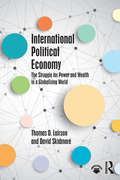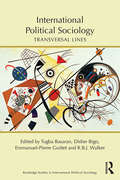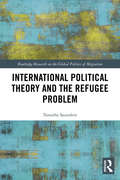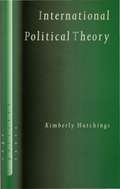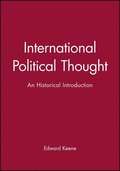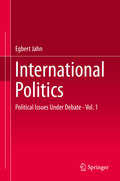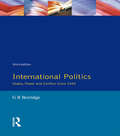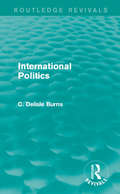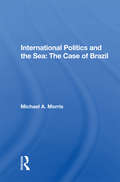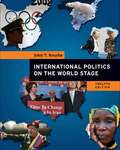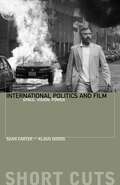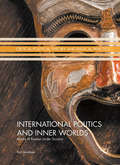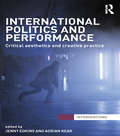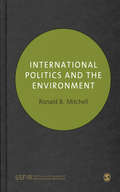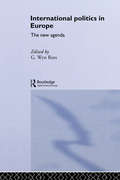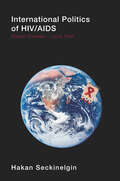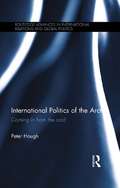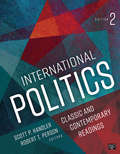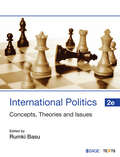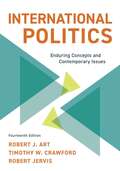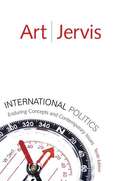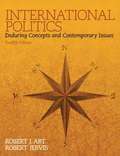- Table View
- List View
International Political Economy: The Struggle for Power and Wealth in a Globalizing World
by David Skidmore Thomas D. LairsonThis text offers a rethinking of the field of international political economy in an era of growing but uneven globalization. Even as global integration advances, states play central roles as partners with the largest of global firms, as the catalysts of competitiveness and economic growth, as the creators of global institutions, and in promoting and responding to global interdependence. Indeed, the struggle for power and wealth within and among states underscores the primacy of politics in understanding current realities. At the same time, new issues and actors complicate the global agenda as it expands to address the environment, global health, and food security. By offering a clear explanation of basic concepts, contextualizing the presentation of theoretical debates, and placing current events in historical context, International Political Economy ensures students a deep understanding of how the global economy works and the ways in which globalization affects their lives and those of people around the world. Key Content and Features Engages debates over the reach and significance of globalization. Examines the sources and consequences of global financial instability. Explores the origins and consequences of global inequality. Compares various strategies of development and state roles in competitiveness. Discusses the role of key international economic institutions. Considers the impact of the rise of China on the global economy and the potential for war and peace. Illustrates collective efforts to fight hunger, disease, and environmental threats. Includes numerous graphs and illustrations throughout and end of chapter discussion questions. Links key concepts for each chapter to a glossary at the end of the book. Provides a list of acronyms at the outset and annotated further readings at the end of each chapter. Offers additional resources on a web site related to the text, including a list of links to IPE-related web pages.
International Political Sociology: Transversal Lines (Routledge Studies in International Political Sociology)
by Didier Bigo Tugba Basaran Emmanuel-Pierre Guittet R. B. WalkerThis book presents an overview and evaluation of contemporary research in international political sociology (IPS). Bringing together leading scholars from many disciplines and diverse geographical backgrounds, it provides unprecedented coverage of the key concepts and research through which IPS has opened up new ways of thinking about international relations. It also considers some of the consequences of such innovations for established forms of social and political analysis. It thus takes the reader on an intellectual journey engaging with questions about boundaries and limits among the many interrelated worlds in which we now live, the ways we conceptualise them, and how we continually reshape boundaries of identities, spaces, authorities and disciplinary knowledge. The volume is organized three sections: Lines, Intersections and Directions. The first section examines some influences that led to the formation of the project of IPS and how it has opened up avenues of research beyond the limits of an international relations discipline shaped within political science. The second section explores some key concepts as well as a series of heated discussions about power and authority, practices and governmentality, performativity and reflexivity. The third section explores some of the transversal topics of research that have been pursued within IPS, including inequality, migration, citizenship, the effect of technology on practices of security, the role of experts and expertise, date-driven surveillance, and the relation between mobility, power and inequality. This book will be an essential source of reference for students and across the social sciences.
International Political Theory after Hobbes
by Raia Prokhovnik Gabriella SlompThe idea of international political theory after Hobbes is a timely and lively focus through which to raise key questions about international politics, and to set up dialogues between historical political theory and contemporary theories of international relations about the legacy of Hobbes in international politics. The move by political theorists towards consideration of the international realm and the consequent blurring of the distinction between domestic and international politics over recent years has been marked. In the light of these changes, the role of Hobbes in the dominant realist theory of international relations requires urgent re-examination. This book makes an important and distinctive contribution to the argument that international political theory is moving beyond the reading of Hobbes as a founding theorist of the modern state in an inter-state system perpetuated by orthodox international relations. The volume brings together a set of internationally-respected researchers with an expertise on Hobbes' views on international relations in the context of the history of political thought, Hobbesian realism, and on Hobbes and contemporary international political theory.
International Political Theory and the Refugee Problem
by Natasha Saunders‘The refugee problem’ is a term that it has become almost impossible to escape. Although used by a wide range of actors involved in work related to forced migration, these actors do not often explain what exactly ‘the problem’ is that they are working to solve, leading to an unfortunate conflation of two quite different ‘problems’: the problems that refugees face and the problems that refugees pose. Beginning from the simple, yet too often overlooked, observation that how one conceives of solving a problem is inseparable from what one understands that problem to be, Saunders’ study explores the questions raised about how to address ‘the refugee problem’ if we recognise that there may not be just one ‘problem’, and that not all actors involved with the refugee regime conceive of their work as addressing the same ‘problem’. Utilising the work of Michel Foucault, the book first charts how different ‘problems’ lend themselves to particular kinds of solutions, arguing that the international refugee regime is best understood as developed to ‘solve’ the refugee (as) problem, rather than refugees’ problems. Turning to the work of Hannah Arendt, the book then reframes ‘the refugee problem’ from the perspective of the refugee, rather than the state, and investigates the extent to which doing so can open up creative space for rethinking the more traditional solutions to the refugee (as) problem. Cases of refugee protest in Europe, and the burgeoning Sanctuary Movement in the UK, are examined as two sub-state and popular movements which could constitute such creative solutions to a reframed problem. The consequences of the ‘refugee’ label, and of the discourses of humanitarianism and emergency is a topic of critical concern, and as such, the book will form important reading for a scholars and students of (international) political theory and forced migration studies.
International Political Theory: Rethinking Ethics in a Global Era (SAGE Politics Texts series #5)
by Kimberly Hutchings`A lucid, comprehensive analysis of normative approaches to international relations, and an original contribution to critical theory' - Andrew Linklater, University of Keele `Hutchings combines a valuable account of the current state of the art with a lucid expositon of her own, highly distinctive, position. This will be required reading for students in international political theory, and indeed anyone interested in normative issues in international relations' - Chris Brown, London School of Economics and Political Science Providing an invaluable overview of the competing schools of thought in traditional and contemporary international theory, this book seeks to path the way forward for new ways of thinking about international political morality. First, the role and place of normative theory in the study of international politics is explained before a discussion of mainstream approaches within international relations and applied ethics. Here the student is introduced to the central debates between realists and idealists, and cosmopolitans and communitarians. Second, the conceptual challenges of contemporary approaches in critical theory, postmodernism and feminism are outlined and then used as a platform to develop the author's own Hegelian-Foucauldian approach for doing normative international theory. Third, the insights drawn from each approach are applied to the study of two key topics in contemporary theoretical debate: the right to self-determination, and the idea of cosmopolitan democracy, and conclusions drawn for transcending the theoretical deadlock in international relations. Accessibly written and wide-ranging, this text will quickly become essential reading for all students and academics of politics and international relations seeking a deeper understanding of the underlying tensions and future potential of international theory today.
International Political Thought: A Historical Introduction
by Edward KeeneThis volume offers an accessible and wide-ranging introduction to the history of international political thought. Taking as its starting-point the various concepts people have used to think about differences between political communities, the book explores changing perceptions of international politics from antiquity to the twentieth century. As well as discussing well-known themes such as relations between independent sovereign states and the tension between raison d'etat and a universal code of natural law, it also examines less familiar ideas which have influenced the development of international political thought such as the distinction between civilization, national culture and barbarism, religious attitudes towards infidels, and theories about racial difference and imperialism. Among the key thinkers covered are Thucydides, Machiavelli, Hobbes, Kant, Marx and Morgenthau, alongside less commonly studied figures such as Herodotus, Pope Innocent IV, Herder, Constant and Zimmern. Each chapter concludes with a guide to further reading which will help students to develop a more detailed understanding of the subject. Written with the beginner student in mind, this lively textbook is an ideal introduction for anyone studying international political thought.
International Politics
by Egbert JahnThis volume analyses the historical background of violent international conflicts. Starting with an analysis of the conflict and cooperation structures in post-communist Eastern Europe and the eastern expansion of the European Union, the author discusses the problem of acts of intervention in response to severe human rights violations, taking Kosovo, Libya and in a further text also Darfur, as examples. To analyse the subject of ethnonational autonomy and independence movements, the author presents case studies on Bosnia-Herzegovina, Belgium, Cyprus, on the Kurdish areas of Iraq, Iran, Syria and Turkey, on Israel/Palestine, on China with regard to Tibet and Xinjiang, and on the genocide of the Armenians in the Ottoman Empire. The classic subjects of inter-state security and armament policy include the controversy over the nuclear policies of Iran and North Korea, while the analysis of the changes in Russia's political system focuses on their far-reaching consequences for international politics. This book will appeal to students and scholars of international relations and peace and conflict studies, as well as to practitioners and decision makers in the field of peace politics.
International Politics
by G R BerridgeA new Edition of this well-established introduction to international polits. As with the previous two editions, the book's emphasisis on states, the conflicts that divide them, the intruments they employ to pursue their ideals and secure their interesrts, and the systems of precepts and practices through which conflicts are worked out.
International Politics (Routledge Revivals)
by C. Delisle BurnsOriginally published in 1920, International Politics provides a general introduction to the subject by looking in detail at the international political situation at the time of writing as well as key issues that frequently appear in these situations. Conclusions are then drawn on which aspects of politics could be improved upon and the function of public opinion as well as providing economic facts to illustrate these points. This title will be of interest to students of politics and political history.
International Politics And The Sea: The Case Of Brazil
by Michael A. MorrisBecause Brazil's emergence as a major power is paralleled by its emergence as an ocean power, the country is a particularly important example of the ocean policies of developing states. Ocean affairs have become increasingly important for Brazilian foreign policy, and Brazil, in turn, has come to occupy a distinctive position in bilateral, regional, and global negotiations for a new ocean order. This book surveys all aspects of Brazilian ocean policy: domestic influences, naval affairs, offshore petroleum exploration, shipping, and fishing. National ocean policy is related to international politics through analysis of Brazil's participation at international maritime conferences and its maritime relations with other states. The final chapter compares Brazil's ocean policy with policies of other states, both developing and developed.
International Politics On The World Stage
by John T. RourkeOne of the leading texts on the IR market, John Rourke's International Politics on the World Stage provides a balanced and comprehensive study of international relations that combines theory, history, and current trends and events. The modern international system, a background history of how it evolved in its present form, as well as transformations that are shaping the 21st century are presented in a straightforward, accessible discussion, without undermining the complexity of world political issues. The text lives up to its reputation of including the latest events and developments of the world stage. Rourke discusses political theory, including contemporary approaches such as constructivism and postmodernism, in the opening chapter. He brings theoretical concepts to life with illustrative examples taken from major current world events, so students see how theory plays out in the real world. The text covers major issues of the twenty-first century, such as the structure of the modern state in the international system, globalisation and the political economy, global security, the rise of intergovernmental and nongovernmental organisations, human rights, and the environment. These topics linked through the chapters in the text give students a grasp of the underlying patterns in world politics, so that they can interpret events they see on the evening news or on the Internet. As in previous editions, the text shows students how politics affects our everyday lives and emphasizes the importance of being politically aware, making informed decisions, and taking responsible action.
International Politics and Film
by Sean CarterInternational Politics and Film introduces readers to the representational qualities of film but also draws attention to how the relationship between the visual and the spatial is constitutive of international politics. Using four themes -- borders, the state of exception, homeland and distant others -- the territorial and imaginative dimensions of international affairs in particular are highlighted. But theis volume also makes clear that international politics is not just something 'out there'; film helps us better understand how it is also part of everyday life within the state -- affecting individuals and communities in different ways depending on axes of difference such as gender, race, class, age, and ethnicity.
International Politics and Film: Space, Vision, Power (Short Cuts)
by Klaus Dodds Sean CarterInternational Politics and Film introduces readers to the representational qualities of film but also draws attention to how the relationship between the visual and the spatial is constitutive of international politics. Using four themes—borders, the state of exception, homeland and distant others—the territorial and imaginative dimensions of international affairs in particular are highlighted. But this volume also makes clear that international politics is not just something "out there"; film helps us better understand how it is also part of everyday life within the state—affecting individuals and communities in different ways depending on axes of difference such as gender, race, class, age, and ethnicity.
International Politics and Inner Worlds
by Kurt JacobsenThis book takes radical aim at the conventional conduct of international relations analysis. It reexamines the role of ideas, the usefulness of psychoanalysis, the rage for and at rational choice, the influence of the public on foreign policy, counterinsurgency evangelism, and development orthodoxies at the national and genetic levels. Drawing a bead on conceptual blind spots prevalent both inside and outside the academy, the book urges scholars to reflect on how inner worlds shape the actions of their subjects--and their own research analyses, as well.
International Politics and Performance: Critical Aesthetics and Creative Practice (Interventions)
by Jenny Edkins Adrian KearIn recent years we have witnessed an increasing convergence of work in International Politics and Performance Studies around the troubled, and often troubling, relationship between politics and aesthetics. Whilst examination of political aesthetics, aesthetic politics, and politics of aesthetic practice has been central to research in both disciplines for some time, the emergence of a distinctive ‘performative turn’ in International Politics and a critical return to the centrality of politics and the concept of ‘the political’ in Performance Studies highlights the importance of investigating the productivity of bringing the methods and approaches of the two fields of enquiry into dialogue and mutual relation. Exploring a wide range of issues including rioting, youth-driven protests, border security practices and the significance of cultural awareness in war, this text provides an accessible and cutting edge survey of the intersection of international politics and performance examining issues surrounding the politics of appearance, image, event and place; and discusses the development and deployment of innovative critical and creative research methods, from auto-ethnography to site-specific theatre-making, from philosophical aesthetics to the aesthetic thought of new securities scenario-planning. The book’s focus throughout is on the materiality of performance practices—on the politics of making, spectating, and participating in a variety of modes as political actors and audiences—whilst also seeking to explicate the performative dynamics of creative and critical thinking. Structured thematically and framed by a detailed introduction and conclusion, the focus is on producing a dialogue between contributors and providing an essential reference point in this developing field. This work is essential reading for students of politics and performance and will be of great interest to students and scholars of IR, performance studies and cultural studies.
International Politics and the Environment (SAGE Series on the Foundations of International Re)
by Dr Ronald B. MitchellThis book provides a sophisticated overview of the theories, concepts and methods central to the complex and contentious field of International Environmental Politics (IEP). Ronald B Mitchell carefully introduces students to the political processes involved in both causing and resolving international environmental problems. Each fully integrated chapter: Links environmental policy to politics, bringing in a wide range of practical real-life examples Deepens students' theoretical understanding, helping them to identify and explain international environmental problems and their solutions Goes beyond description and develops students' ability to evaluate claims about outcomes in international environmental politics through empirical testing. A rounded, in-depth examination of IEP, this book has been specifically written for graduate and advanced undergraduate courses in global environmental politics and modules of broader international relations programs. SAGE Series on the Foundations of International Relations Series Editors: Walter Carlsnaes Uppsala University, Sweden Jeffrey T. Checkel Simon Fraser University, Canada International Advisory Board: Peter J. Katzenstein Cornell University, USA Emanuel Adler University of Toronto, Canada Martha Finnemore George Washington University, USA Andrew Hurrell Oxford University, UK G. John Ikenberry Princeton University, USA Beth Simmons Harvard University, USA Steve Smith University of Exeter, UK Michael Zuern Hertie School of Governance, Berlin, Germany The SAGE Foundations series fills the gap between narrowly-focused research monographs and broad introductory texts, providing graduate students with state-of-the-art, critical overviews of the key sub-fields within International Relations: International Political Economy, International Security, Foreign Policy Analysis, International Organization, Normative IR Theory, International Environmental Politics, Globalization, and IR Theory. Explicitly designed to further the transatlantic dialogue fostered by publications such as the SAGE Handbook of International Relations, the series is written by renowned scholars drawn from North America, continental Europe and the UK. The books are intended as core texts on advanced courses in IR, taking students beyond the basics and into the heart of the debates within each field, encouraging an independent, critical approach and signposting further avenues of research.
International Politics in Europe: The New Agenda
by G. Wyn ReesThroughout much of Europe the preoccupation with military security that dominated political thinking after the end of the Second World War has given way to an emphasis upon mutual interdependence. But what does this mean, both theoretically and practically, terms of a `new' agenda? The focus of this book is upon four main issues:* economic development* security * the environment * human rightsThese are of course not in themselves new issues, but during the period of the Cold War they were subordinated to the ideological division of the continent. Now they have emerged as decisive in the way in which Europe will develop. The authors examine the four issues in depth, and draw out the links between them. They also examine the various levels at which these problems exist - the level of the `system', of the state and of the individual. Thus it is possible for them to illustrate general issues with specific reference to local, national and Europe-wide political debates.
International Politics of HIV/AIDS: Global Disease-Local Pain
by Hakan SeckinelginThis book examines the global governance of the HIV/AIDS epidemic, interrogating the role of this international system and global discourse on HIV/AIDS interventions. The geographical focus is Sub-Saharan Africa since the region has been at the forefront of these interventions. There is a need to understand the relationship between the international political environment and the impact of resulting policies on HIV/AIDS in the context of people’s lives. Hakan Seckinelgin points out a certain disjuncture between this governance structures and the way people experience the disease in their everyday lives. Although the structure allows people to emerge as policy relevant target groups and beneficiaries, the articulation of needs and design of policy interventions tends to reflect international priorities rather than people’s thinking on the problem. In other words, he argues that while the international interventions highlight the importance attributed to the HIV/AIDS problem, the nature of the system does not allow interventions to be far reaching and sustainable. Offering a critical contribution to the understanding of the problems in HIV/AIDS in Sub-Saharan Africa, International Politics of HIV/AIDS will be invaluable to students and researchers of health, international politics and development.
International Politics of the Arctic: Coming in from the Cold (Routledge Advances in International Relations and Global Politics)
by Peter HoughThis book offers a wide-ranging account of the emerging issues of international politics in the Artic, and the emerging Geopolitical debates that surround the region. In this thorough but accessible book covering environmental issues, the author examines the Geopolitics of emerging land and resource disputes and the rise of both nationalist and pan-Arctic movements in the region. Whereas existing literature on the politics of the Arctic tends to focus either on the environment or on Geopolitical interests, this book considers both of these themes in addition to the politics of the region’s indigenous peoples and provides an overview on the emerging issues of international politics in the Arctic. The book makes full use of pedagogic features such as maps, diagrams, timelines, biographies and boxes highlighting key concepts and issues in order to make this an accessible book for both students and scholars alike. This book will be of interest to students and scholars of International Relations, Arctic Politics, Environmental Politics and European Politics.
International Politics: Classic and Contemporary Readings
by Scott P. Handler Robert T. PersonWhy do states do what they do? Who are the relevant nonstate actors in international politics and why do they do what they do? What causes conflict and cooperation in the international system? These are some of the most basic questions that the discipline of International Relations (IR) seeks to answer; they are also the questions that drive the objectives, organization and content of this book. International Politics: Classic and Contemporary Readings, Second Edition seeks to help students engage critically with some of the world’s most challenging questions through the use of leading classic and contemporary scholarship in the field of international relations. The first five chapters of the book explore the leading theoretical traditions in international relations, while subsequent chapters explore the themes of international security, international political economy, and contemporary challenges in international relations. This organization makes the book easy to use as standalone text or alongside core text. Class-tested on over 10,000 students in the last decade, this text was built from the ground up to introduce students to the traditions and new foundations of international relations as well to the principles of intellectually rigorous thought.
International Politics: Classic and Contemporary Readings
by Scott P. Handler Robert T. PersonWhy do states do what they do? Who are the relevant nonstate actors in international politics and why do they do what they do? What causes conflict and cooperation in the international system? These are some of the most basic questions that the discipline of International Relations (IR) seeks to answer; they are also the questions that drive the objectives, organization and content of this book. International Politics: Classic and Contemporary Readings, Second Edition seeks to help students engage critically with some of the world’s most challenging questions through the use of leading classic and contemporary scholarship in the field of international relations. The first five chapters of the book explore the leading theoretical traditions in international relations, while subsequent chapters explore the themes of international security, international political economy, and contemporary challenges in international relations. This organization makes the book easy to use as standalone text or alongside core text. Class-tested on over 10,000 students in the last decade, this text was built from the ground up to introduce students to the traditions and new foundations of international relations as well to the principles of intellectually rigorous thought.
International Politics: Concepts, Theories and Issues
by Rumki BasuThis multi-authored textbook helps to critically understand the major concepts, theories and issues of international politics in a constantly changing environment. Designed as a core textbook for undergraduate and postgraduate students, this book provides a roadmap to orient students to the main concepts, theories and issues in world politics today. Each chapter provides an analytical overview of the issues addressed, identifies the central actors and perspectives, and outlines past progress and future prospects. The highlight of the book is a critical overview of the major theories of international politics apart from a fairly detailed chapter on India's foreign policy. This revised edition includes new chapters on the impacts of globalization, regionalism and global politics and perspectives from the global South. Debates and discourses on contemporary issues such as terrorism, human rights, development, security and the role and relevance of international organizations have been updated to suit recent curriculum requirements. Key Features • Critical overview of the major theories and issues of international politics • Updated data added with illustrations in every chapter • Each chapter aided by model questions for classroom discussion
International Politics: Enduring Concepts And Contemporary Issues
by Robert J. Art Robert Jervis Timothy W. CrawfordInternational Politics: Enduring Concepts and Contemporary Issues has been helping students understand the dynamics of international relations for fifty years. Readings by leading scholars on essential topics illustrate fundamental debates and differing points of view for a comprehensive and engaging overview of the discipline, while introducing readers to the major forces shaping the world today. The fourteenth edition continues the book’s cornerstone approach of combining foundational theoretical works with recent perspectives on current problems, including a wealth of new material spread across each of the book’s four parts. The foundational material is organized to highlight the concept of anarchy in international relations and how matters of security, power, military force, international political economy, and strategic interactions influence patterns of cooperation and conflict. In additional to a focus on basic security and strategic problems, the politics of international commerce, and challenges facing the global economy, this edition also covers critical contemporary issues, including human rights, civil wars, intervention and peacekeeping, migration, cyber conflict, great power competition, climate change, energy transition, nuclear weapons, pandemic diplomacy, and changes in the political shape of the system writ large. Features: 60 expertly edited readings from scholarly sources, with 30 new to this edition A four-part organization to cover anarchy, the use of force, international political economy, and contemporary issues, with an in-depth editor introduction to each Part An entirely new chapter on the return of great power politics -- ever-more important after Russia's invasion of Ukraine Learning objectives and discussion questions to focus student learning
International Politics: Enduring Concepts And Contemporary Issues, 10th Edition
by Robert J. Art Robert JervisFifty papers by scholars of economics, international relations, and related fields discuss the anarchic structure of international relations, the use of force, the international political economy, and contemporary world politics. Current issues like international cooperation, nuclear proliferation, globalization, terrorism, failed states, and climate change receive special attention.
International Politics: Enduring Concepts and Contemporary Issues Twelfth Edition
by Robert J. Art Robert JervisChallenging students to use original scholarship to recognize and analyze patterns in world politics, this bestselling reader considers how to effectively understand politics under governments and beyond. Carefully edited selections cover the most essential topics and are put into conversation with each other to illustrate fundamental debates and differing points of view. Comprehensive and engaging, International Politics offers the best overview of the discipline as well as the forces shaping the world today.
